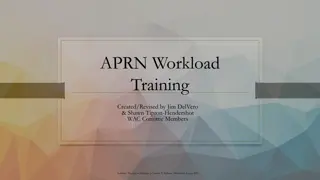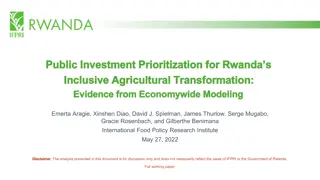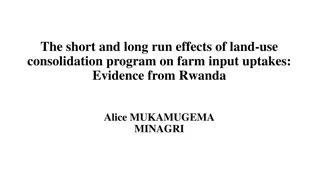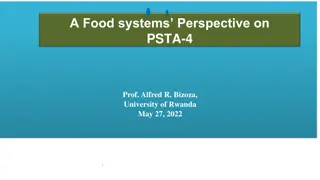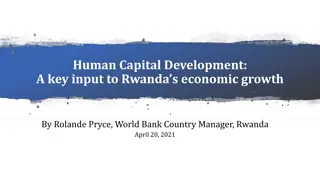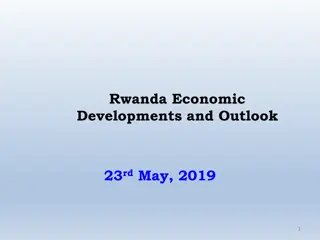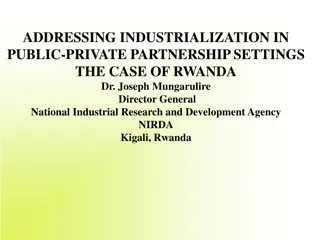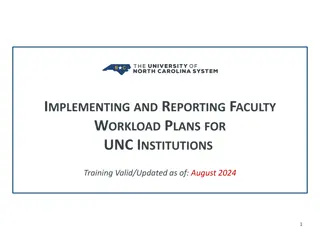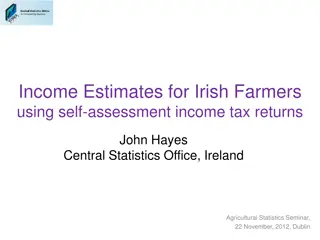Valuing Control Over Income and Workload in Rwanda
Field experiment in Rwanda explores trade-offs for policymakers, such as introducing new crop varieties impacting income control for women. The study assesses the value of programs affecting workload, income autonomy, and empowerment through lab-in-the-field experiments and surveys. Experimental tasks measure preferences for income control and workload changes to understand individual valuations.
Download Presentation

Please find below an Image/Link to download the presentation.
The content on the website is provided AS IS for your information and personal use only. It may not be sold, licensed, or shared on other websites without obtaining consent from the author. Download presentation by click this link. If you encounter any issues during the download, it is possible that the publisher has removed the file from their server.
E N D
Presentation Transcript
Valuing control over income and workload: A field experiment in Rwanda Berber Kramer International Food Policy Research Institute (IFPRI), Nairobi, Kenya 8thEPRN Research Conference Kigali, May 27, 2022
Some difficult trade-offs for policymakers: Introducing a new bean variety increases net household income but replaces a variety for which women used to control the proceeds, reducing their personal income. Roll out this new variety? One climate information service helps both women and men save time, whereas another program reduces women s workload more, but doesn t help men save time. In which program to invest in order to maximize total welfare? A women s empowerment program creates new job opportunities for women, increasing their income, but also their workload. Can we consider this program to be empowering, and do we want to invest in this program? Existing tools to measure program impacts on women s empowerment capture changes in levels of empowerment, but how are these changes valued?
A tool to value changes in workload and income autonomy Using lab-in-the-field experiments, we aim to measure how respondents value: o changes in workload; o changes in income autonomy; and o how they manage trade-offs between them. Field experiment has been implemented with 1000 respondents from 500 households spread across 4 cooperatives in Rwanda Experiment repeated ahead of each major agricultural activity until the harvest phase (4 rounds). We also administered survey modules to measure levels of women s empowerment, such as IFPRI s project-level Women s Empowerment in Agriculture Index (pro-WEAI)
Experimental task #1: Valuing control over income For these scenarios, do you prefer RWF 3,000 paid to yourself RWF 2,500 paid to yourself RWF 2,000 paid to yourself OR OR OR RWF 2,500 paid to your spouse RWF 2,500 paid to your spouse RWF 2,500 paid to your spouse RWF 1,000 paid to yourself RWF 2,500 paid to your spouse OR This first task elicits a respondents valuation of control over income (Almas et al, EJ 2018). In the first choice, most participants will choose to be paid RWF 3,000 themselves At a later choice, most will switch and choose a higher level of income paid to their spouse How much income is someone willing to sacrifice in order to be paid him- or herself?
Experimental task #2: Valuing changes in workload For these scenarios, do you prefer RWF 2,500 OR RWF 2,500 OR RWF 2,500 OR RWF 2,500 OR RWF 2,500 + 1 day of labor RWF 2,000 + 1 day of labor RWF 1,500 + 1 day of labor RWF 500 + 1 day of labor This second task elicits a respondents valuation of a change in workload (Agness et al, NBER 2021). In the first choice, most participants will opt for the free labor At a later choice, as the labor cost goes up, most will switch and choose not to pay for labor How much is someone willing to pay to reduce his/her workload by a day? And does this depend on whether the money is paid to the respondent, or to his/her spouse?
Variations in the experiment All choices are made with payments being made either in cash or in kind (soap). This is varied across rounds. We also vary whether participants choose which day the labor is provided (flexibility), versus whether we assign the labor on a fixed day. Experiment is incentivized to elicit revealed instead of hypothetical preferences.
Findings regarding womens empowerment Overall, women are less empowered than men Not driven by a lack of control over use of income Main contributors to disempowerment: Lack of autonomy in decision making Limited self efficacy High workload, especially for women, and in later rounds: Round 1 0.338 0.498 Round 2 0.372 0.646 Round 3 0.384 0.620 Round 4 0.402 0.654 Men Women
Willingness to pay for control over income Women are willing to pay more for control over income than men Receiving payments in cash increases willingness to pay, but not significantly so
Willingness to pay for a reduced workload Own income (direct control over income) Spouse income (no direct control over income) No significant differences in willingness to pay for women versus men Regardless of whether respondent would control the income saved from not hiring any labor
Conclusion How to value changes in important areas of empowerment, such as control over income or workload? We address this question using a lab-in-the-field experiment in Rwanda. Surveys indicate that women are less empowered than men, with main contributors of disempowerment including a high workload but not a lack of control over income. Experimental findings indeed find that women are willing to sacrifice more household income to gain control over income than their husbands, but the difference is modest. We find that both women and men are willing to forgo significantly more personal and household income with the aim of reducing their workload. Agricultural development programs that introduce time-saving practices and technologies have potentially greater positive welfare impacts for both women and men than programs increasing women s control over resources. Additional analyses find that survey-based measures of levels of control over income and work balance do not correlate well with the experimentally elicited valuations for the two. We will further investigate the linkages between these concepts through qualitative research.










